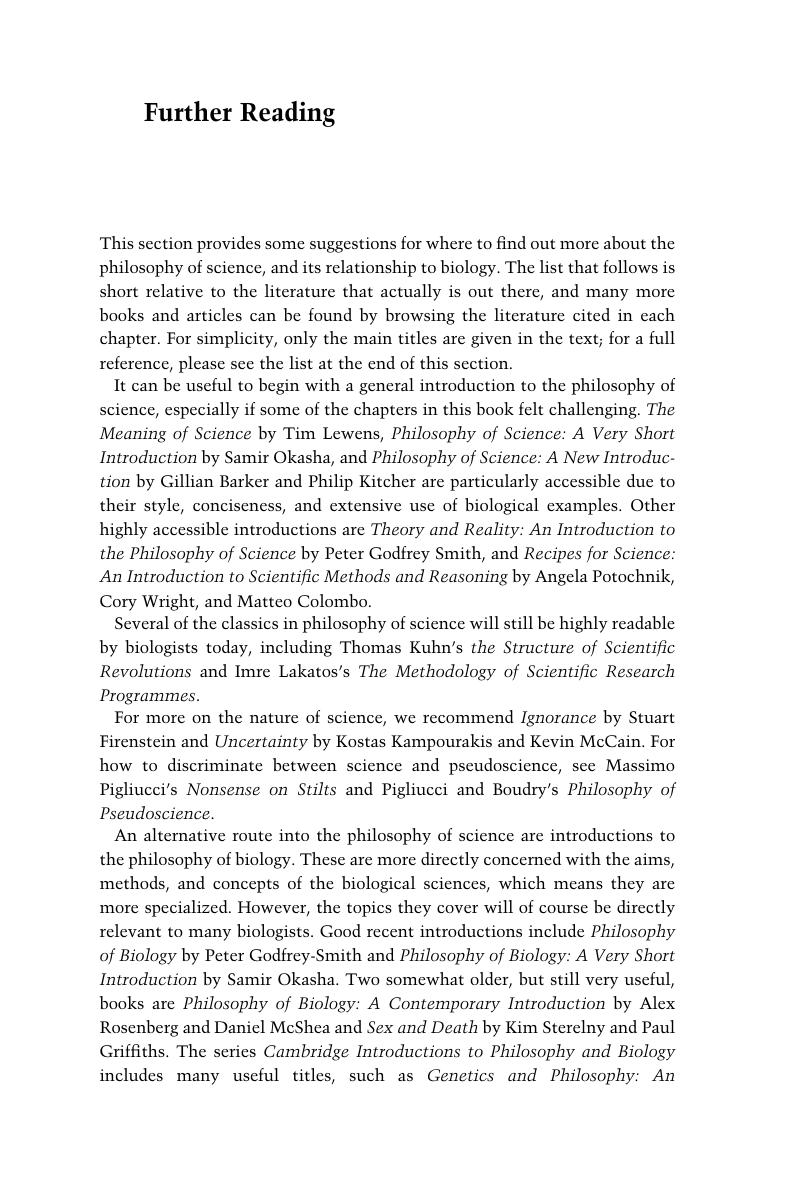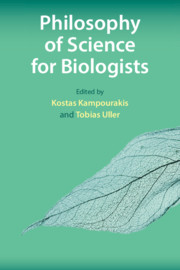Book contents
- Philosophy of Science for Biologists
- Philosophy of Science for Biologists
- Copyright page
- Contents
- Contributors
- Preface
- 1 Why Should Biologists Care about the Philosophy of Science?
- 2 What Constitutes an Explanation in Biology?
- 3 What Is Biological Knowledge?
- 4 What Is the Nature of Theories and Models in Biology?
- 5 How Are Biology Concepts Used and Transformed?
- 6 Why Does It Matter That Many Biology Concepts Are Metaphors?
- 7 How Do Concepts Contribute to Scientific Advancement?
- 8 How Can Conceptual Analysis Contribute to Scientific Practice?
- 9 What Methods Do Life Scientists Use?
- 10 Is It Possible to Scientifically Reconstruct the History of Life on Earth?
- 11 What Is the Basis of Biological Classification?
- 12 What Is the Nature of Scientific Controversies in the Biological Sciences?
- 13 What Is the Relation between Facts and Values in Biological Science?
- 14 A Philosopher in the Age of Creationism
- 15 How Can We Teach Philosophy of Science to Biologists?
- Further Reading
- Index
- References
Further Reading
Published online by Cambridge University Press: 04 September 2020
- Philosophy of Science for Biologists
- Philosophy of Science for Biologists
- Copyright page
- Contents
- Contributors
- Preface
- 1 Why Should Biologists Care about the Philosophy of Science?
- 2 What Constitutes an Explanation in Biology?
- 3 What Is Biological Knowledge?
- 4 What Is the Nature of Theories and Models in Biology?
- 5 How Are Biology Concepts Used and Transformed?
- 6 Why Does It Matter That Many Biology Concepts Are Metaphors?
- 7 How Do Concepts Contribute to Scientific Advancement?
- 8 How Can Conceptual Analysis Contribute to Scientific Practice?
- 9 What Methods Do Life Scientists Use?
- 10 Is It Possible to Scientifically Reconstruct the History of Life on Earth?
- 11 What Is the Basis of Biological Classification?
- 12 What Is the Nature of Scientific Controversies in the Biological Sciences?
- 13 What Is the Relation between Facts and Values in Biological Science?
- 14 A Philosopher in the Age of Creationism
- 15 How Can We Teach Philosophy of Science to Biologists?
- Further Reading
- Index
- References
Summary

Information
- Type
- Chapter
- Information
- Philosophy of Science for Biologists , pp. 313 - 318Publisher: Cambridge University PressPrint publication year: 2020
References
Further Reading
This section provides some suggestions for where to find out more about the philosophy of science, and its relationship to biology. The list that follows is short relative to the literature that actually is out there, and many more books and articles can be found by browsing the literature cited in each chapter. For simplicity, only the main titles are given in the text; for a full reference, please see the list at the end of this section.
It can be useful to begin with a general introduction to the philosophy of science, especially if some of the chapters in this book felt challenging. The Meaning of Science by Tim Lewens, Philosophy of Science: A Very Short Introduction by Samir Okasha, and Philosophy of Science: A New Introduction by Gillian Barker and Philip Kitcher are particularly accessible due to their style, conciseness, and extensive use of biological examples. Other highly accessible introductions are Theory and Reality: An Introduction to the Philosophy of Science by Peter Godfrey Smith, and Recipes for Science: An Introduction to Scientific Methods and Reasoning by Angela Potochnik, Cory Wright, and Matteo Colombo.
Several of the classics in philosophy of science will still be highly readable by biologists today, including Thomas Kuhn’s the Structure of Scientific Revolutions and Imre Lakatos’s The Methodology of Scientific Research Programmes.
For more on the nature of science, we recommend Ignorance by Stuart Firenstein and Uncertainty by Kostas Kampourakis and Kevin McCain. For how to discriminate between science and pseudoscience, see Massimo Pigliucci’s Nonsense on Stilts and Pigliucci and Boudry’s Philosophy of Pseudoscience.
An alternative route into the philosophy of science are introductions to the philosophy of biology. These are more directly concerned with the aims, methods, and concepts of the biological sciences, which means they are more specialized. However, the topics they cover will of course be directly relevant to many biologists. Good recent introductions include Philosophy of Biology by Peter Godfrey-Smith and Philosophy of Biology: A Very Short Introduction by Samir Okasha. Two somewhat older, but still very useful, books are Philosophy of Biology: A Contemporary Introduction by Alex Rosenberg and Daniel McShea and Sex and Death by Kim Sterelny and Paul Griffiths. The series Cambridge Introductions to Philosophy and Biology includes many useful titles, such as Genetics and Philosophy: An Introduction by Paul Griffiths and Karola Stotz. Concise and biologist-friendly introductions to many of the key themes of philosophy of biology are found in The Philosophy of Biology: A Companion for Educators edited by Kostas Kampourakis. A more popular but highly recommended book that weaves together philosophy of science and biology is Other Minds: The Octopus and the Evolution of Intelligent Life by Peter Godfrey-Smith.
The specialized literature on explanation, understanding, and knowledge can be difficult to explore for biologists, and it may be hard to know where to start. Idealization and the Aims of Science by Angela Potochnik is biologist-friendly not only because of its scope but also because she frequently relies on examples from physiology, ecology, and evolutionary biology. The arguments in James Woodward’s Making Things Happen will likely appeal to many biologists, and it is an important book that has shaped much of the recent discussion about causal explanation in biology. Philosophical theories of causation meet scientific practice in Causality by Phyllis Illari and Federica Russo. A recent award-winning account of the relationship between explanation and understanding is Understanding Scientific Understanding by Henk De Regt. The Nature of Scientific Knowledge by Kevin McCain covers many more ideas than what we could fit within the pages of the book you are reading now.
The chapters in this book give many good pointers to papers that explore the role of conceptual analysis in biology. For a book-length overview of the role of metaphors in science, we particularly recommend Metaphors We Live by by George Lakoff and Mark Johnson. Nancy Nersessian explores how concepts arise and evolve in Creating Scientific Concepts. One of the trickiest concepts in biology is undoubtedly that of a mechanism. In Search of Mechanisms by Carl Craver and Lindley Darden offers an argument for why mechanism is central to biology and how biologists go on to discover and characterize them. If mechanisms lie at one end of the explanatory agenda, then we find historical events like the extinction of dinosaurs at the other. Adrian Currie’s Bone, Rock and Ruin is a passionate argument for the scientific value of historical biology.
Many of the topics covered by the authors in the present book are examined in detail from the perspective of cancer research by Anya Plutuynski in Understanding Cancer. Making Sense of Genes by Kostas Kampourakis explains genetics by making extensive use of philosophical analysis. Biology today is very data intense, and this raises important philosophical issues that are explored in Data-Centric Biology: A Philosophical Study by Sabina Leonelli. Heather Douglas discusses the role of values in science in Science, Policy, and the Value-Free Ideal. Bernard Rollin’s Science and Ethics is a very informative and accessible book on bioethics.
Looking to the history of a science can tell us much about how it works in practice. The Century of the Gene by Evelyn Fox Keller is an engaging account of classical and molecular genetics, rich in philosophical insight. Ron Amundson’s history of evolutionary developmental biology – The Changing Role of the Embryo in Evolutionary Thought – illustrates how concepts and idealizations shape entire scientific disciplines. Daniel Sepkoski’s Rereading the Fossil Record: The Growth of Paleobiology as an Evolutionary Discipline is an excellent illustration of the social and scientific interplay during the establishment of a research program. At the heart of many biological controversies are different views on the organism itself, which is the theme of Jessica Riskin’s The Restless Clock and Erik Peterson’s The Life Organic. While it is not about biology, Hasok Chang’s Is Water H20? is a captivating case study of conceptual change and a thought-provoking argument for scientific pluralism.
In addition to these suggestions and the references in individual chapters, many entries to topics in philosophy of science can be found in the Stanford Encyclopedia of Philosophy. Some professional journals devoted to the philosophy of biology are Biology and Philosophy and Philosophy, Theory and Practice in Biology.
